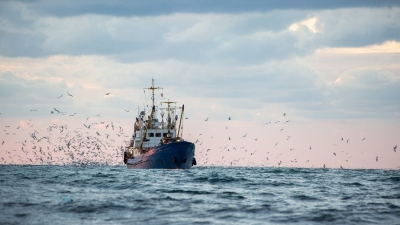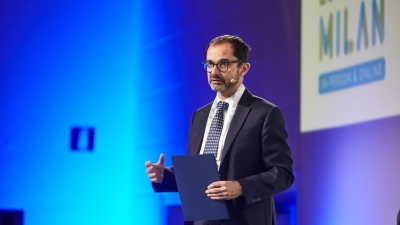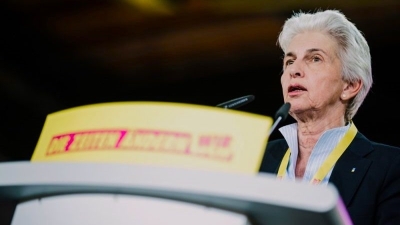EU lawmakers back hefty fines for companies making false green claims

Companies making claims like “eco” and “green” will need to send them for prior verification before using them or face fines of “at least at 4% of their annual turnover”, according to a draft EU law voted on in the European Parliament on Wednesday (14 February).
The Green Claims Directive, presented by the European Commission in March last year, seeks to put an end to greenwashing by requiring companies to make sure environmental claims are verified and backed by scientific evidence.
The law passed a key hurdle yesterday when it was voted in a joint session of the European Parliament’s committees on the environment and the internal market, with 85 votes in favour, 2 against and 14 abstentions.
Overall, there are 230 sustainability labels and 100 green energy labels in the EU, with vastly different levels of transparency, the Commission says. An EU study found that 40% of green claims made by companies were “completely unsubstantiated” while 53% were found to be “vague, misleading or unfounded”.
“Consumers and entrepreneurs deserve transparency, legal clarity, and equal conditions of competition,” said Andrus Ansip, a lawmaker from Estonia who is the Parliament’s speaker on the proposal for the internal market committee.
According to the text adopted by the two Parliament committees, claims will have to be assessed by accredited verifiers within 30 days. To accelerate procedures, MEPs tasked the Commission with drawing up a list of less complex claims that could benefit from faster verification.
“Traders are willing to pay for it, but not more than they gain from it,” Ansip explained, saying this will make the directive less burdensome for businesses.
Micro-enterprises will be excluded from the rules, while small companies will benefit from a one-year delay.
In case of infringement, companies will face penalties, including confiscation of revenues and “a fine of at least at 4% of their annual turnover,” the Parliament said in a statement.
Penalties will be enforced by national authorities, which have to regularly control green claims, publicly disclose their findings, and fine companies who mislead consumers.

EU clamps down on misleading ecolabels with penalties against greenwashing
The European Commission tabled new legislation on Wednesday (22 March) to tackle misleading environmental claims by introducing penalties against greenwashing and tighter rules for the approval of new ecolabels.
Tighter rules for carbon offsets
In a key aspect of the text, MEPs also endorsed rules allowing companies to make claims based on carbon offsets, whereby businesses compensate emissions by measures like tree-planting, which absorb CO2.
According to the text voted on Wednesday, companies can only mention offsetting schemes if they have already reduced their emissions substantially and use those schemes for residual emissions only.
Carbon offsets are popular among airlines, which sell them to consumers as a way of compensating for emissions generated by burning jet fuel.
Those CO2 credits can be traded on the voluntary carbon market but they are controversial because many of them rely on carbon accounting methodologies that are not standardised and impossible to verify.
The permanence of the carbon removals is also a reason for concern as trees planted under those schemes can die from pests or wildfires.
Under the deal voted on in Parliament yesterday, any carbon credits generated by offsetting schemes will have to be certified under the EU’s Carbon Removals Certification Framework, which is currently being negotiated by EU legislators.
Crucially, the Parliament text says private companies can only balance their fossil fuel emissions with permanent removal credits as defined by the CRCF.
Permanent carbon removals are generated by industrial technologies like bioenergy with carbon capture and storage (BioCCS) and direct air capture (DAC), which involves giant fans sucking CO2 directly from the atmosphere.
Carbon gap, an environmental NGO, welcomed the tighter rules voted by Parliament, saying they prevent companies from using offsets as a tool to continue business as usual.
“Claims can support climate action and the transition towards a higher integrity voluntary carbon market, as long as they do not hinder emissions reduction efforts and are based on high-quality carbon credits,” said Matteo Guidi, associate policy lead at Carbon Gap.
Rodica Avornic, associate policy director at Carbon Gap, added that “companies would not be able to continue offsetting their fossil fuel emissions with cheap and low-durability credits, and will therefore have to cut them and compensate the residual part with permanent removals”.
Next steps
The next step is a Parliament plenary vote, which could take place in March.
Before becoming law, the text also needs approval by the Council of EU member states, which has not adopted its position yet. A final agreement on the directive is expected to be reached after the European Parliament elections in June.
The Green Claims Directive complements another text, on empowering consumers in the green transition, which was passed recently in the European Parliament after a deal was reached with the Council earlier in September.
This directive bans claims like “climate-neutral” or “climate-positive”, which rely on carbon offsets, effective as of 2026.
Meanwhile, Parliament and Council are expected to finalise negotiations on the EU’s Carbon Removals Certification Framework during trilogue talks on 19 February.
Read more with Euractiv




